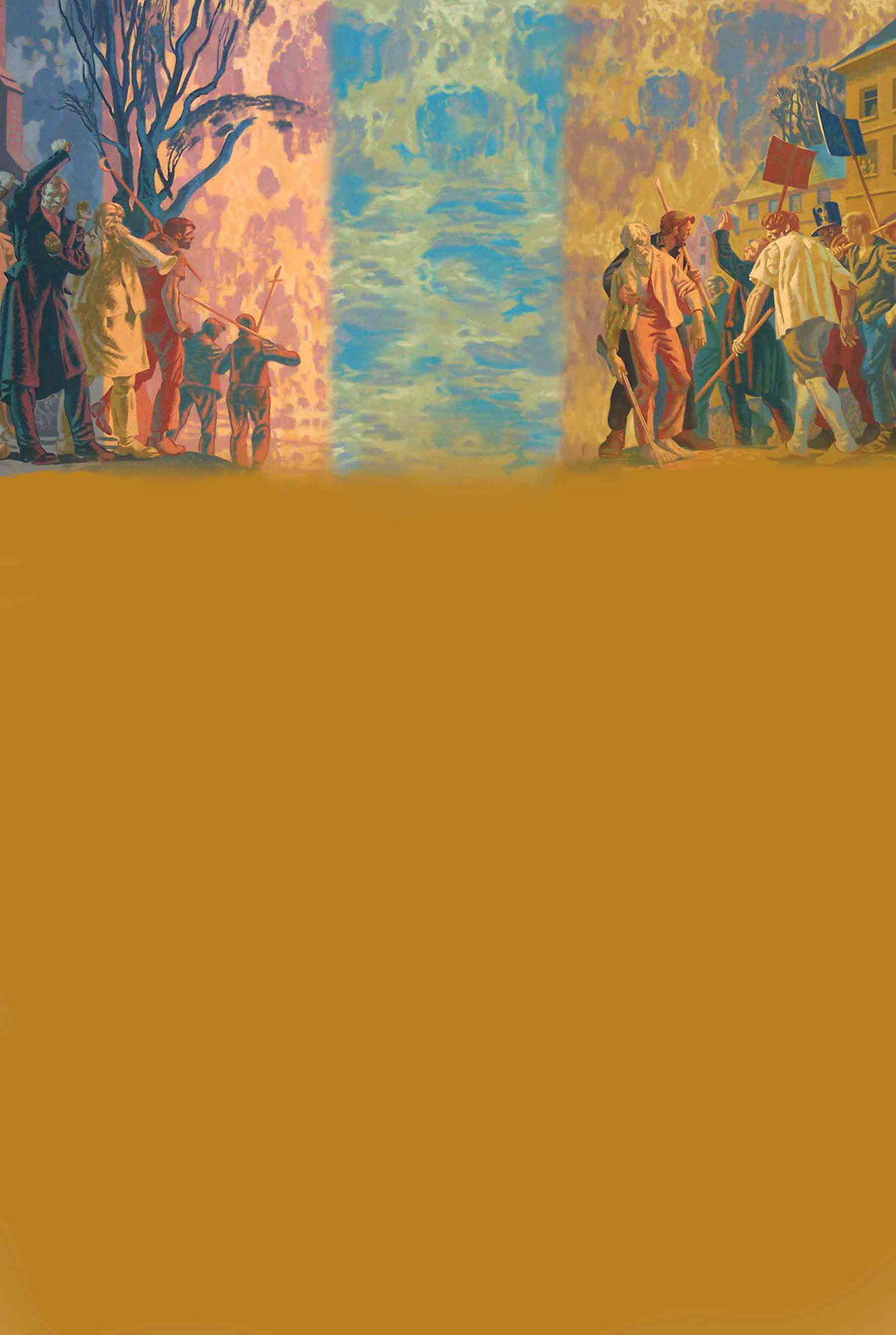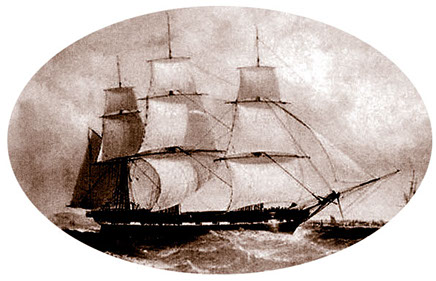

Book Preview: 'Render the Chartists Defenceless: John Frost’s voyage with Dr McKechnie to Van Diemen’s Land 1840', by Les James
Publishers: Three Impostors (Newport)
Available November 1st 2015
See also a detailed analysis of the book
This is a story of unequals – John Frost, Zephaniah Williams and William Jones, the three ‘Welsh Martyrs’ versus the powerful propertied elite of Victorian society. During 1839, thousands joined the fifty Chartist lodges set up across south Wales and immediately came into conflict with the Monmouthshire magistrates, who banned meetings and imprisoned leaders for ‘sedition’; Chartist reaction to this oppression took the form of a ‘Rising’ that failed in November 1839. Although not personally responsible for the battle in which over 20 Chartists were killed by the 45th Regiment at the Westgate inn, Frost had headed up the leadership and directed some 5,000 men towards Newport.
From October 1839 onwards, Frost, Williams and Jones entered a netherworld of informers, spies and agent provocateurs, run by ‘public servants’, doing their duty, and backed up by a compliant press and corrupt political system. The book covers the period of British imperial history, when the British state was nascent and fragile in form and could not afford to spare its efforts in taming and defeating the Chartist movement and its campaign for political rights, which sprang on to the British political scene in 1838-39. Chartism remained a serious challenge to governments until at least 1848-49 and did not cease to exist organisationally until 1858/60. Throughout this period, the landed class, who controlled Parliament, refused the demands of the People’s Charter for a democratic constitution, based upon one man, one vote. They feared such changes would herald a revolution akin to that of 1789 in France.
As its sub-title makes clear, Render the Chartists Defenceless is not a text book on Chartism, it tells the story of John Frost’s transportation to Van Diemen’s Land aboard the Mandarin under the superintendence of Dr. Alexander McKechnie RN. It is a series of overlapping stories concerning Frost’s transportation in 1840 and of his return to Britain in 1856; it plots the rise of McKechnie within the Royal Navy’s medical corps to become Inspector General of Hospitals and Fleets in 1854 based at Haslar Hospital, Gosport. Its very definite central theme regales the travails of a powerless and principled man thwarted, trapped, sidelined by a state in the hands of a wealthy elite, prepared to ruthlessly crush him when he dared to defend his dignity and that of the hundreds of thousands of others, who had suffered degradation at their hands.
All three men had been found guilty of leading an insurrection and were sentenced to death for High Treason at the Shire Hall, Monmouth on January 16th. Each man faced a public hanging. The gallows were being erected on the roof of Monmouth gaol’s gatehouse, above the cell that they shared. They could hear the carpenters above them, making ready a death machine for public spectacle. Following execution of a traitor, the body was beheaded and quartered. According to Frost, the Prison Governor, Mr. Ford taunted the three of them, asking how they wanted their bodies disposed. Set for February 2nd, the execution date was changed by the Home Secretary to the 6th and then surprisingly, suddenly scrapped – such was the public outcry, so great was the abhorrence expressed of the punishment by people who would never dream of supporting the Charter. Altogether, more people signed the various petitions for the clemency of the three ‘Welsh Martyrs’ than had signed the first National Petition in the previous year (1839) for the six points of the People’s Charter.
Unlike Frost, Williams and Jones never returned to Britain and other than each sending one letter home from the Mandarin, in which they both expressed gratitude to Dr McKechnie for the care and attention he gave to their needs, neither man is known to have said anything more about the four months voyage. In the years ahead, both cut their ties with Wales. Although each made this decision for differing reasons and in different ways, the origins of their decision in both cases can be found in their experiences aboard the Mandarin. Whilst aboard the Mandarin, Williams wrote at least one other letter. He was coaxed into telling the authorities what he knew about the planning of the November Rising in south Wales. A copy of his letter written to Dr Mckechnie was found in the Tredegar Estate papers in 1939.
Render the Chartists Defenceless is a mystery story. How did this letter come in to the ownership of Octavius Morgan M.P? What use did the authorities make of it? Did Frost know about this confession? Maybe, he knew something of its contents? If so, he never mentioned the letter. Nor did he talk about the Rising, in which we know from various sound sources, he was embroiled. Throughout the trial, his time in custody and onwards, he insisted the three ‘Welsh martyrs’ maintain a ‘wall of silence’ concerning the Rising. He never publicly criticised other Chartists. But what happened between the three ‘Welsh Chartists’? When leaving Monmouth, Williams and Frost were close. Events on the Mandarin drove a wedge between the two men. On his return in 1856, he said nothing about the Rising, until pressed and then little beyond suspecting he was the victim of government spies. He scorned the aristocratic landed elite – notably Lords Palmerston, Normanby, Wellington, Russell and the Morgan family of Tredegar Park – accusing them of exiling him and preventing his return. Their agents such as Ford at Monmouth, Sir John Franklin (Governor of Van Diemen’s Land), Captain Booth, the Commandant at Port Arthur and above all others, Dr McKechnie, were in his sights.
Frost’s encounter with McKechnie lasted only four months, they never met again, but when Frost returned from Van Diemens Land, it was McKechnie he was probing and seeking to bring to the bar of history. Despite his kindnesses, he had proved deceptive and manipulative, according to Frost’s recollections. Dr. Mckechnie and his aides played on the minds of three men ‘all at sea’. Whatever the comforts he provided and hopes he encouraged, McKechnie broke their unity and left them isolated in Van Diemen’s Land, facing authorities in Hobart, London and south Wales, who sought to punish them as a warning to others and with no intention of allowing them to return home.
How had McKechnie interacted with Booth, Franklin and Russell?
For Frost, McKechnie was clearly the man who placed him in exile. Yet, he found McKechnie a difficult man to pin down – he was also the ‘good’ doctor who got him there in sound health. As always, close scrutiny of historical detail displaces stereotypes and thanks to recent development of on-line digital sources, unavailable to previous writers, a more rounded characterisation of both Dr McKechnie and John Frost has been possible. This research reveals the complex self interest at work of two men from modest origins seeking to better themselves in a world of ‘glass ceilings’.
Frost returned when granted a full pardon in 1856. His faith in Chartism undaunted, he astonished the authorities with his forthright denunciations of his treatment and defence of the six principles of the People’s Charter. The press and political apparatus cranked again into action, to silence him. He died in his 93rd year unhonoured, but not without honour. His reputation as an honest and principled democrat remained intact. Within thirty years of his death, his name and the strength of his character enjoyed a revival. The ideals espoused by the Chartists emerged as the basis of democratic politics in 20th century Britain.
This book is not a John Frost hagiography, but neither is it intended as a character assassination of Dr. McKechnie. This is history, ‘messy’ and told from a multiplicity of angles. Les James explores the differing but interconnected situations within mid-nineteenth century Britain, Van Diemens Land and on a ship travelling between them. He leaves readers puzzling over the partial and contradictory evidence available. He hints and guides, but ends with uncertain ‘loose ends’ and very few conclusions. There’s more to be discovered, debated and written.
Michael Sheen in his foreword reflects on the challenges for today raised by the Chartists’ struggle.
© Leslie James 2015
Three Impostors
Three Impostors is a small publisher established in Newport, south Wales in 2012, with the aim of producing high quality, scholarly versions of interesting, rare and out-of-print books, along with other related new writing. To date, the titles of this publishing house have been entirely devoted to raising the reputation of an author, born at Caerleon in 1863, who in recent times has been neglected in his country of birth and childhood.
Appropriately this three man ‘not for profit’ publishing venture has taken its name from one of Arthur Machen’s novels. Their project is prospering. The first two republished volumes of Machen’s autobiography have been sell outs and the handsomely produced volume 3 was given a rapturous reception at its London launch this month. New literature feeding off Machen’s work is being promoted - Our Unknown Everywhere, based on Iain Sinclair’s lecture (2013) celebrating the 150th anniversary of Machen’s birth and Machen’s Gwent by the Welsh poet, Catherine Fisher. With the Arthur Machen collection on the doorstep at Newport Library, we can look forward to more to come.
Render the Chartists Defenceless takes the Three Imposters into new territory, publishing a narrative concerned with the transportation of Three Chartist ‘Martyrs’ from Wales to the Antipodes and how over sixteen years later, one of them, John Frost, angrily returned to challenge the authorities for their mistreatment, was bludgeoned by a hostile press and refused a place in his home town of Newport by the local elite. This book explores Frost’s own writings, which can be found in the Chartist collection at Newport Library, a rich vein waiting to be mined for further Three Imposters’ publications.
www.threeimpostors.co.uk
(Directors: Richard Frame, Mark Lawson-Jones, David Osmond)








